Unit 2 What time do you go to school? Section B(3a-Self Check)课件(共30张PPT)
文档属性
| 名称 | Unit 2 What time do you go to school? Section B(3a-Self Check)课件(共30张PPT) |  | |
| 格式 | pptx | ||
| 文件大小 | 7.9MB | ||
| 资源类型 | 教案 | ||
| 版本资源 | 人教新目标(Go for it)版 | ||
| 科目 | 英语 | ||
| 更新时间 | 2022-02-17 14:39:33 | ||
图片预览

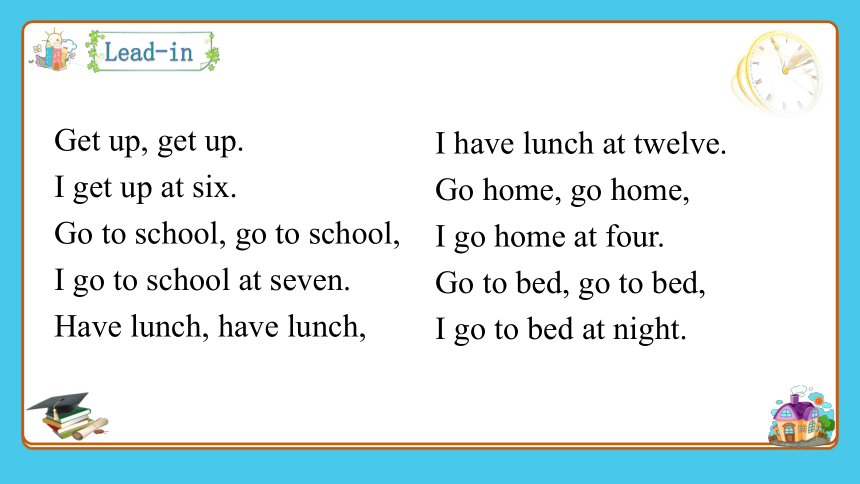
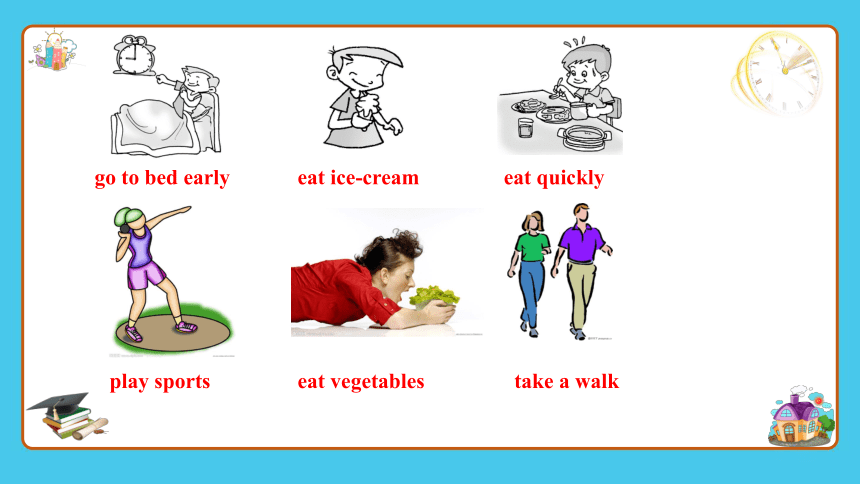
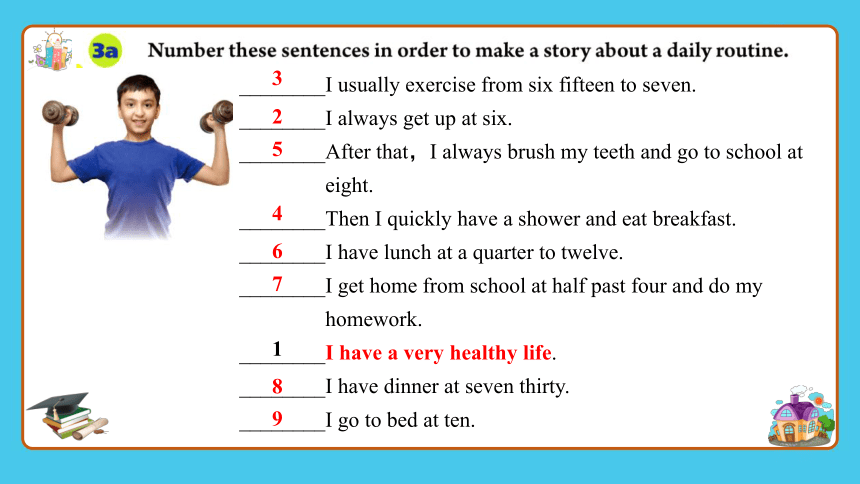

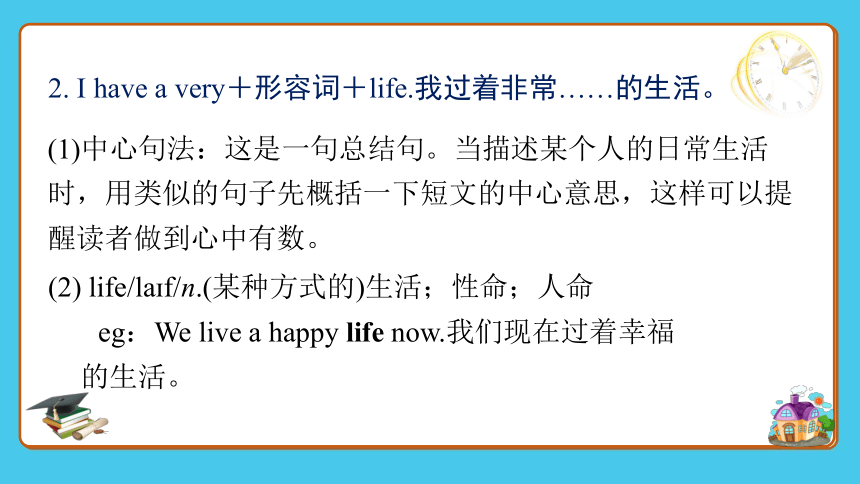
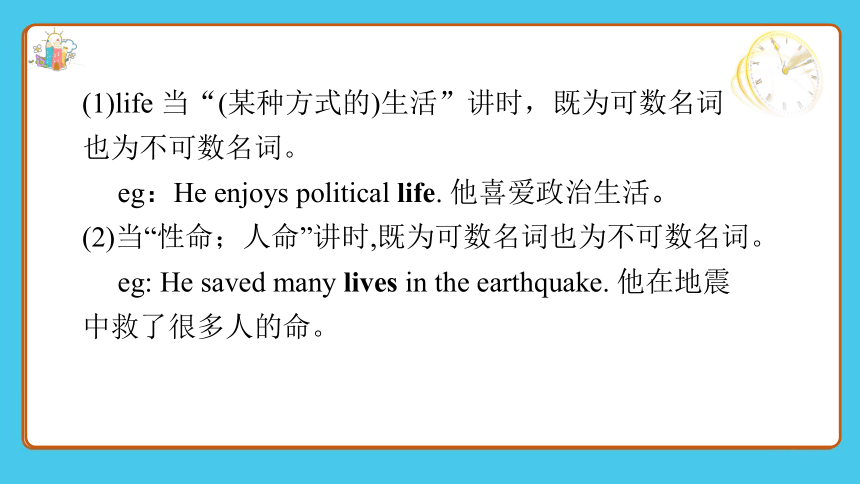
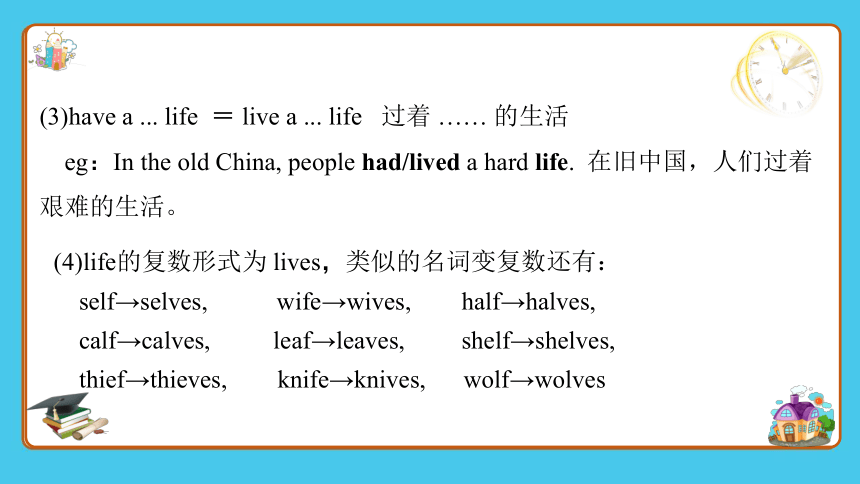
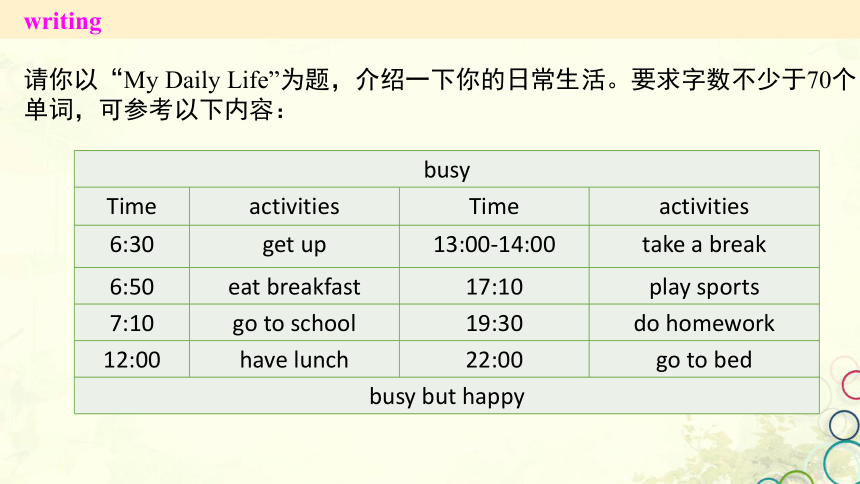
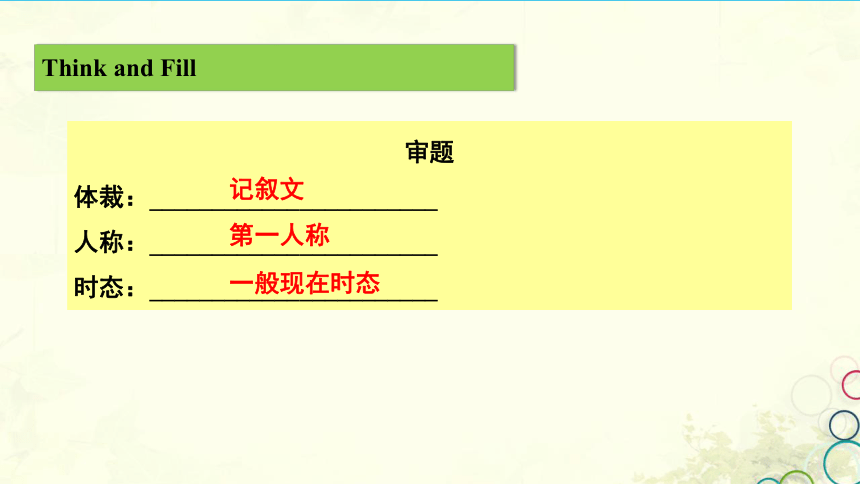
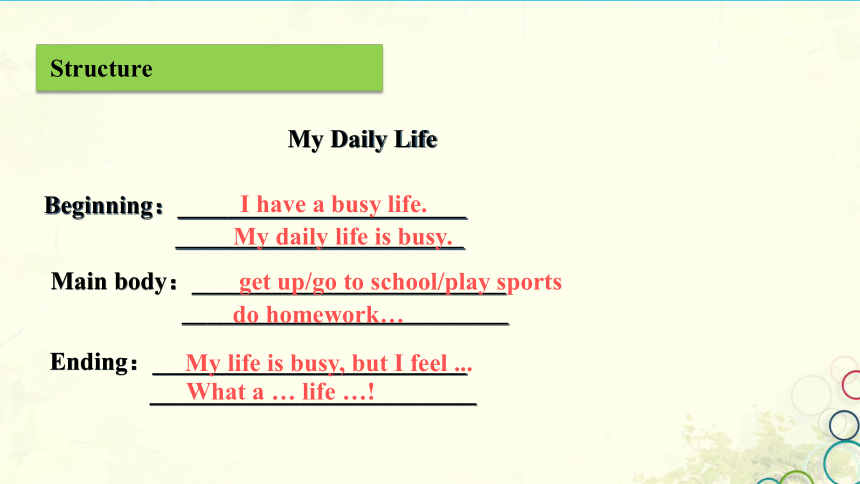
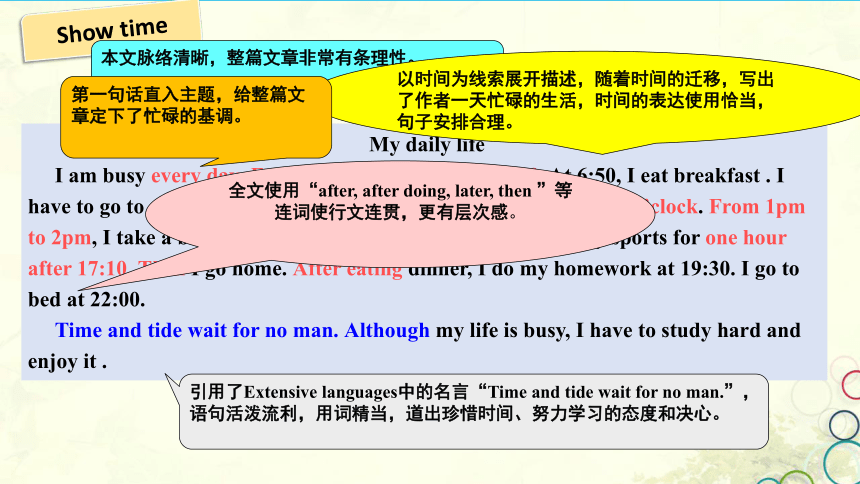
文档简介
(共30张PPT)
Section B(3a-Self Check)
Unit 2
What time do you go to school
Lead-in
Get up, get up.
I get up at six.
Go to school, go to school,
I go to school at seven.
Have lunch, have lunch,
I have lunch at twelve.
Go home, go home,
I go home at four.
Go to bed, go to bed,
I go to bed at night.
go to bed early
eat ice-cream
eat quickly
play sports
eat vegetables
take a walk
________I usually exercise from six fifteen to seven.
________I always get up at six.
________After that,I always brush my teeth and go to school at
eight.
________Then I quickly have a shower and eat breakfast.
________I have lunch at a quarter to twelve.
________I get home from school at half past four and do my
homework.
________I have a very healthy life.
________I have dinner at seven thirty.
________I go to bed at ten.
3
2
5
4
6
7
1
8
9
1.life作名词,意为“生活”,指生活方式,是可数名词。其复数形式为lives。
We have a happy life in China.
在中国我们过着愉快的生活。
The old women’s lives are very difficult.
那些老年妇女的生活很困难。
Language points
2. I have a very+形容词+life.我过着非常……的生活。
(1)中心句法:这是一句总结句。当描述某个人的日常生活时,用类似的句子先概括一下短文的中心意思,这样可以提醒读者做到心中有数。
(2) life/la f/n.(某种方式的)生活;性命;人命
eg:We live a happy life now.我们现在过着幸福的生活。
(1)life 当“(某种方式的)生活”讲时,既为可数名词也为不可数名词。
eg:He enjoys political life. 他喜爱政治生活。
(2)当“性命;人命”讲时,既为可数名词也为不可数名词。
eg: He saved many lives in the earthquake. 他在地震中救了很多人的命。
(3)have a ... life = live a ... life 过着 …… 的生活
eg:In the old China, people had/lived a hard life. 在旧中国,人们过着艰难的生活。
(4)life的复数形式为 lives,类似的名词变复数还有:
self→selves, wife→wives, half→halves,
calf→calves, leaf→leaves, shelf→shelves,
thief→thieves, knife→knives, wolf→wolves
writing
busy Time activities Time activities
6:30 get up 13:00-14:00 take a break
6:50 eat breakfast 17:10 play sports
7:10 go to school 19:30 do homework
12:00 have lunch 22:00 go to bed
busy but happy 请你以“My Daily Life”为题,介绍一下你的日常生活。要求字数不少于70个单词,可参考以下内容:
Think and Fill
审题
体裁:_______________________
人称:_______________________
时态:_______________________
第一人称
一般现在时态
记叙文
My Daily Life
Beginning:_______________________
_______________________
Main body:_________________________
__________________________
Ending:_________________________
__________________________
get up/go to school/play sports
do homework…
My life is busy, but I feel ...
I have a busy life.
My daily life is busy.
Structure
What a … life …!
My daily life
I am busy every day. Every morning, I get up at 6:30. At 6:50, I eat breakfast . I have to go to school at ten past seven. I often have lunch at twelve o’clock. From 1pm to 2pm, I take a break. Later, have my class. Sometimes, I play sports for one hour after 17:10. Then I go home. After eating dinner, I do my homework at 19:30. I go to bed at 22:00.
Time and tide wait for no man. Although my life is busy, I have to study hard and enjoy it .
全文使用“after, after doing, later, then ”等连词使行文连贯,更有层次感。
引用了Extensive languages中的名言“Time and tide wait for no man.”,语句活泼流利,用词精当,道出珍惜时间、努力学习的态度和决心。
Show time
本文脉络清晰,整篇文章非常有条理性。
以时间为线索展开描述,随着时间的迁移,写出了作者一天忙碌的生活,时间的表达使用恰当,句子安排合理。
第一句话直入主题,给整篇文章定下了忙碌的基调。
My daily life
During weekdays, my daily life is as busy as most of students in China. In the morning, I have to get up at 6:30. Twenty minutes later, I eat breakfast. At 7:10, I go to school. There are 5 classes in the morning. I often have lunch at twelve o’clock. At 1pm, I begin to take a break. It often lasts for one hour. Half an hour Later, I have my another three classes. After class, I play sports for one hour. It’s good for my health. I have much homework to do. I begin to do it at 19:30. I don’t go to bed until ten every evening.
What a busy life it is ! But I think it is meaningful because I can learn a lot and enjoy it every day .
通过使用“in the morning, at twelve, every evening”等时间的表达,使文章衔接连贯自然,同时又使用“There are…, I begin to … It lasts… I have another… ”等句式使文章语言丰富流畅,亮点突出,字里行间都体现出了忙碌的一天。
结尾处表明作者的观点,要珍惜时间,努力学习,享受生活,引起读者共鸣。
本文思路清晰,结构完整,全部涵盖了图表内容。
第一句话以学生的角度现身说法,通过短语 “as …as”的运用, 巧妙地以点带面,表明了学生的日常生活是忙碌的。
Make phrases with the words in the boxes.
taste
clean
have
get
take
brush
your teeth
my room
a walk
good
dressed
a good job
1
________________
_______________
_______________
_______________
_______________
_______________
taste good
clean my room
have a good job
get dressed
brush your teeth
take a walk
Self Check
Use the phrases to complete the sentences.
taste good, clean my room, have a good job,
get dressed, brush your teeth, take a walk
1. Ice-cream usually _____________ so students like to eat it after school.
2. My grandparents are very healthy. They always ___________ after dinner.
3. You need to _______________ after eating to have good teeth.
4. He _____________. He works at a radio station.
5. Here are your clothes. Go and _______ quickly!
6. I don’t have time to ______________ from Monday to Friday. So I clean it on weekends.
1. Ice-cream usually _________ so students like to eat it after school.
2. My grandparents are very healthy. They always __________ after dinner.
3. You need to _______________ after eating to have a good teeth.
tastes good
brush your teeth
take a walk
4. He _______________. He works at a radio station.
5. Here are your clothes. Go and __________ quickly!
6. I don’t have time to ______________ from Monday to Friday. So I clean it on weekends.
clean my room
has a good job
get dressed
1. A: _______ (your mother/usually/get up)
B: ____________ (5:45)
A: _____________ (why/get up/so early)
B: ___________ (always make breakfast for me)
2
Complete the conversations with questions and answers. Use the words in the brackets to help you.
2. A: ___________ (you/usually/get to school
B: ____________ (7:30)
A: _________ (your class teacher / usually / get to school)
B: I don’t know. But he/she is never late for the first class in the morning.
1. A: ______________________________
B: ______________________________
A: ________________________________
B: _______________________________
Check the answers.
She usually gets up at a quarter to six.
Why does she get up so early
She always makes breakfast for me.
When does your mother usually get up
2. A: _____________________________
B: ________________________________
A: ______________________________ ___________________________
B: I don’t know. But he/she is never late for the first class in the morning.
When do you usually get to school
I usually get to school at half past seven.
When does your class teacher usually
get to school
( )1. We go to school ______7:30.
A. in B. at C. on
( ) 2. I run at six_____ the morning.
A. at B. in C. on
( ) 3. He can do _____ homework by himself.
A. her B. him C. his
( ) 4. Don’t speak! Listen _____ the teacher.
A. to B. in C. at
B
B
C
A
单项选择
根据首字母或汉语提示完成句子。
1. Here are your shoes. Go and clean them q !
2. The food is bad for your health, but it t good.
3. I e go shopping o_ take a walk with my friends on weekends.
ither
uickly
astes
r
根据首字母或汉语提示完成句子。
4. My grandparents (过着健康幸福的生活).
5. I have no time to (做运动) from Monday to Friday.
6. I eat (许多水果和蔬菜) every day.
have a healthy and happy life
play sports
lots of fruit and vegetables
does
do
put, sleep, get, have, take, look, work, do, tell, speak
1.—What your brother ___ in the evening
—He watches TV at home.
2.Do you like a little longer in the morning
3.—Where your uncle —In Beijing.
4.He on his jacket and goes to work.
5. — Can you a little Chinese —Yes, I can.
does
sleeping / to sleep
work
speak
puts
用方框中所给单词的适当形式填空。
put, sleep, get, have, take, look, work, do, tell, speak
6.Which bus shall I
7.What time you lunch
8. me what his job is.
9.He to the bus stop very late. The bus leaves.
10. at the clock. It’s time to go home.
Tell
do
have
Look
gets
用方框中所给单词的适当形式填空。
take
翻译句子:
1. 谢谢你的帮助。
2. 八点钟开始上课。
3.我想知道他的情况。
Thanks for your help. /Thank you for your help.
Class starts at 8:00.
I want to know about him.
4. 我想去打篮球。
5. 她每晚做家庭作业。
6. Mike 经常把自己的学习情况告诉妈妈。
I want to play basketball.
She does her homework every evening.
Mike usually tells his mother about his study.
Time
Activity
7:00
get up
7:30
8:00--11:00
12:00
14:00--17:00
18:00
19:00--21:00
21:30
have breakfast
do homework
have lunch
play football with friends
have supper
watch TV at home
go to bed
2.Group2:Suppose you have a pen pal in the USA. Write something about his/her daily routine.
homework
1.Group1:Recite the new words and phrases on page12
Section B(3a-Self Check)
Unit 2
What time do you go to school
Lead-in
Get up, get up.
I get up at six.
Go to school, go to school,
I go to school at seven.
Have lunch, have lunch,
I have lunch at twelve.
Go home, go home,
I go home at four.
Go to bed, go to bed,
I go to bed at night.
go to bed early
eat ice-cream
eat quickly
play sports
eat vegetables
take a walk
________I usually exercise from six fifteen to seven.
________I always get up at six.
________After that,I always brush my teeth and go to school at
eight.
________Then I quickly have a shower and eat breakfast.
________I have lunch at a quarter to twelve.
________I get home from school at half past four and do my
homework.
________I have a very healthy life.
________I have dinner at seven thirty.
________I go to bed at ten.
3
2
5
4
6
7
1
8
9
1.life作名词,意为“生活”,指生活方式,是可数名词。其复数形式为lives。
We have a happy life in China.
在中国我们过着愉快的生活。
The old women’s lives are very difficult.
那些老年妇女的生活很困难。
Language points
2. I have a very+形容词+life.我过着非常……的生活。
(1)中心句法:这是一句总结句。当描述某个人的日常生活时,用类似的句子先概括一下短文的中心意思,这样可以提醒读者做到心中有数。
(2) life/la f/n.(某种方式的)生活;性命;人命
eg:We live a happy life now.我们现在过着幸福的生活。
(1)life 当“(某种方式的)生活”讲时,既为可数名词也为不可数名词。
eg:He enjoys political life. 他喜爱政治生活。
(2)当“性命;人命”讲时,既为可数名词也为不可数名词。
eg: He saved many lives in the earthquake. 他在地震中救了很多人的命。
(3)have a ... life = live a ... life 过着 …… 的生活
eg:In the old China, people had/lived a hard life. 在旧中国,人们过着艰难的生活。
(4)life的复数形式为 lives,类似的名词变复数还有:
self→selves, wife→wives, half→halves,
calf→calves, leaf→leaves, shelf→shelves,
thief→thieves, knife→knives, wolf→wolves
writing
busy Time activities Time activities
6:30 get up 13:00-14:00 take a break
6:50 eat breakfast 17:10 play sports
7:10 go to school 19:30 do homework
12:00 have lunch 22:00 go to bed
busy but happy 请你以“My Daily Life”为题,介绍一下你的日常生活。要求字数不少于70个单词,可参考以下内容:
Think and Fill
审题
体裁:_______________________
人称:_______________________
时态:_______________________
第一人称
一般现在时态
记叙文
My Daily Life
Beginning:_______________________
_______________________
Main body:_________________________
__________________________
Ending:_________________________
__________________________
get up/go to school/play sports
do homework…
My life is busy, but I feel ...
I have a busy life.
My daily life is busy.
Structure
What a … life …!
My daily life
I am busy every day. Every morning, I get up at 6:30. At 6:50, I eat breakfast . I have to go to school at ten past seven. I often have lunch at twelve o’clock. From 1pm to 2pm, I take a break. Later, have my class. Sometimes, I play sports for one hour after 17:10. Then I go home. After eating dinner, I do my homework at 19:30. I go to bed at 22:00.
Time and tide wait for no man. Although my life is busy, I have to study hard and enjoy it .
全文使用“after, after doing, later, then ”等连词使行文连贯,更有层次感。
引用了Extensive languages中的名言“Time and tide wait for no man.”,语句活泼流利,用词精当,道出珍惜时间、努力学习的态度和决心。
Show time
本文脉络清晰,整篇文章非常有条理性。
以时间为线索展开描述,随着时间的迁移,写出了作者一天忙碌的生活,时间的表达使用恰当,句子安排合理。
第一句话直入主题,给整篇文章定下了忙碌的基调。
My daily life
During weekdays, my daily life is as busy as most of students in China. In the morning, I have to get up at 6:30. Twenty minutes later, I eat breakfast. At 7:10, I go to school. There are 5 classes in the morning. I often have lunch at twelve o’clock. At 1pm, I begin to take a break. It often lasts for one hour. Half an hour Later, I have my another three classes. After class, I play sports for one hour. It’s good for my health. I have much homework to do. I begin to do it at 19:30. I don’t go to bed until ten every evening.
What a busy life it is ! But I think it is meaningful because I can learn a lot and enjoy it every day .
通过使用“in the morning, at twelve, every evening”等时间的表达,使文章衔接连贯自然,同时又使用“There are…, I begin to … It lasts… I have another… ”等句式使文章语言丰富流畅,亮点突出,字里行间都体现出了忙碌的一天。
结尾处表明作者的观点,要珍惜时间,努力学习,享受生活,引起读者共鸣。
本文思路清晰,结构完整,全部涵盖了图表内容。
第一句话以学生的角度现身说法,通过短语 “as …as”的运用, 巧妙地以点带面,表明了学生的日常生活是忙碌的。
Make phrases with the words in the boxes.
taste
clean
have
get
take
brush
your teeth
my room
a walk
good
dressed
a good job
1
________________
_______________
_______________
_______________
_______________
_______________
taste good
clean my room
have a good job
get dressed
brush your teeth
take a walk
Self Check
Use the phrases to complete the sentences.
taste good, clean my room, have a good job,
get dressed, brush your teeth, take a walk
1. Ice-cream usually _____________ so students like to eat it after school.
2. My grandparents are very healthy. They always ___________ after dinner.
3. You need to _______________ after eating to have good teeth.
4. He _____________. He works at a radio station.
5. Here are your clothes. Go and _______ quickly!
6. I don’t have time to ______________ from Monday to Friday. So I clean it on weekends.
1. Ice-cream usually _________ so students like to eat it after school.
2. My grandparents are very healthy. They always __________ after dinner.
3. You need to _______________ after eating to have a good teeth.
tastes good
brush your teeth
take a walk
4. He _______________. He works at a radio station.
5. Here are your clothes. Go and __________ quickly!
6. I don’t have time to ______________ from Monday to Friday. So I clean it on weekends.
clean my room
has a good job
get dressed
1. A: _______ (your mother/usually/get up)
B: ____________ (5:45)
A: _____________ (why/get up/so early)
B: ___________ (always make breakfast for me)
2
Complete the conversations with questions and answers. Use the words in the brackets to help you.
2. A: ___________ (you/usually/get to school
B: ____________ (7:30)
A: _________ (your class teacher / usually / get to school)
B: I don’t know. But he/she is never late for the first class in the morning.
1. A: ______________________________
B: ______________________________
A: ________________________________
B: _______________________________
Check the answers.
She usually gets up at a quarter to six.
Why does she get up so early
She always makes breakfast for me.
When does your mother usually get up
2. A: _____________________________
B: ________________________________
A: ______________________________ ___________________________
B: I don’t know. But he/she is never late for the first class in the morning.
When do you usually get to school
I usually get to school at half past seven.
When does your class teacher usually
get to school
( )1. We go to school ______7:30.
A. in B. at C. on
( ) 2. I run at six_____ the morning.
A. at B. in C. on
( ) 3. He can do _____ homework by himself.
A. her B. him C. his
( ) 4. Don’t speak! Listen _____ the teacher.
A. to B. in C. at
B
B
C
A
单项选择
根据首字母或汉语提示完成句子。
1. Here are your shoes. Go and clean them q !
2. The food is bad for your health, but it t good.
3. I e go shopping o_ take a walk with my friends on weekends.
ither
uickly
astes
r
根据首字母或汉语提示完成句子。
4. My grandparents (过着健康幸福的生活).
5. I have no time to (做运动) from Monday to Friday.
6. I eat (许多水果和蔬菜) every day.
have a healthy and happy life
play sports
lots of fruit and vegetables
does
do
put, sleep, get, have, take, look, work, do, tell, speak
1.—What your brother ___ in the evening
—He watches TV at home.
2.Do you like a little longer in the morning
3.—Where your uncle —In Beijing.
4.He on his jacket and goes to work.
5. — Can you a little Chinese —Yes, I can.
does
sleeping / to sleep
work
speak
puts
用方框中所给单词的适当形式填空。
put, sleep, get, have, take, look, work, do, tell, speak
6.Which bus shall I
7.What time you lunch
8. me what his job is.
9.He to the bus stop very late. The bus leaves.
10. at the clock. It’s time to go home.
Tell
do
have
Look
gets
用方框中所给单词的适当形式填空。
take
翻译句子:
1. 谢谢你的帮助。
2. 八点钟开始上课。
3.我想知道他的情况。
Thanks for your help. /Thank you for your help.
Class starts at 8:00.
I want to know about him.
4. 我想去打篮球。
5. 她每晚做家庭作业。
6. Mike 经常把自己的学习情况告诉妈妈。
I want to play basketball.
She does her homework every evening.
Mike usually tells his mother about his study.
Time
Activity
7:00
get up
7:30
8:00--11:00
12:00
14:00--17:00
18:00
19:00--21:00
21:30
have breakfast
do homework
have lunch
play football with friends
have supper
watch TV at home
go to bed
2.Group2:Suppose you have a pen pal in the USA. Write something about his/her daily routine.
homework
1.Group1:Recite the new words and phrases on page12
同课章节目录
- Unit 1 Can you play the guitar?
- Section A
- Section B
- Unit 2 What time do you go to school?
- Section A
- Section B
- Unit 3 How do you get to school?
- Section A
- Section B
- Unit 4 Don't eat in class.
- Section A
- Section B
- Unit 5 Why do you like pandas?
- Section A
- Section B
- Unit 6 I'm watching TV.
- Section A
- Section B
- Review of Units 1-6
- Unit 7 It's raining!
- Section A
- Section B
- Unit 8 Is there a post office near here?
- Section A
- Section B
- Unit 9 What does he look like?
- Section A
- Section B
- Unit 10 I'd like some noodles.
- Section A
- Section B
- Unit 11 How was your school trip?
- Section A
- Section B
- Unit 12 What did you do last weekend?
- Section A
- Section B
